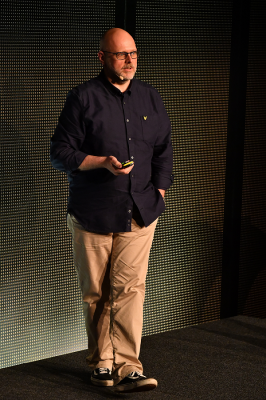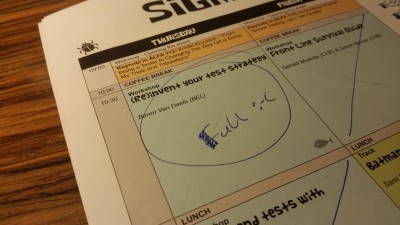The
journey to deliver my first conference talk and making it out alive.

How it started…
In April I visited our office in Budapest and
was asked to give a presentation of an ongoing project I was conducting. After
the presentation I was approached by one of the attendees who thought it was a
good presentation and suggested that I should apply for the HUSTEF conference. Since
I had done presentations at various meetups and answered to the call for paper
for other conferences in the past I was quite intrigued by the idea. I had not
heard of this specific conference earlier but after checking their web site and
looking through some of the previous talks held there I was convinced that it
would be a good place to do a talk.
Preparations
I prepared and sorted information around the topic, wrote a biography, sketched an initial version of the presentation and submitted my paper just in time for the deadline in mid-May. A month later I received a mail that started with: “Congratulations. Your proposal #60 with the title A quality nerd in a DevOps world has been accepted for HUSTEF 2017 Conference.”
At this point I was struck by Speaker’s Remorse but at the same time I felt that this was something I really wanted to do, so I shuck it off and turned my attention to what needed to be done in order to get ready.
Knowing I’m a master of procrastination I laid out a time plan for completing the slides well in advance of the deadline. One challenge was the time constraint for the actual talk, 25 minutes including Q&A. My plan was to address testing in the DevOps tool chain, how we applied our version of Googles Test Certified model and ideas on building cross functional teams which meant that I had to boil down three ~30 minutes presentation into one 20+ minutes talk. Cutting out samples, quotes, funny references, slides covering buzz words et.c. I had a set that ought to work. I did quite a few dry runs with that slide set and I felt it was working fine. Average time for the dry runs was a few seconds shy of 20 minutes.
While I’m at it…
Since we have an office in Budapest I planned to arrange a Meetup there while I was in town and deliver a more in-depth version of my talk. I contacted two of the largest local testing Meetup groups but in the end they had planned for other sessions during that same week and we couldn’t quite synchronize our schedules. The door is still open for any future visits though.
The conference
The first conference day was a half day with tutorials and in the evening there was a speaker’s dinner where I had the luck to get a seat next to Dawn Hayes who was one of the tutorial and keynote speakers for the conference. Had a nice dinner with good discussions before taking a scenic evening stroll over the bridge across the Danube back to the hotel.
Second and third conference days consisted of keynotes, sponsor presentations and track talks. There were two parallel tracks so one could select the ones that corresponded most with your area of interest.
My slot was the last track talk on the last day, just before coffee and to top it off the conference party was planned for the evening before. This all catered for the likelihood of having a slightly tired and not to focused audience.
The talk
After lunch it was time to get prepared and enter the “presenter zone”. I watched the two preceding talks, deep down hoping for them to be kind of rubbish so mine would be conceived better, turned out they were both excellent (in fact the guy before me won the speaker award).
I thought that I would be a nervous wreck by the time it was my turn but I felt nothing but a small adrenaline rush as I entered the stage. The spotlights made it hard to really see the crowd of some 250-ish people but I did a quick intro and started my presentation.
Trying to keep my mind on the audience and the message I delivered my talk and finished within the allotted time. Got some questions that showed that people had listened and heard what I had to say. Talking to a couple of people from the audience afterwards and checking the postings gave an indication that the talk was well received.
Aftermath…
During the conference the audience could vote on the different talks via the conference app. As it turned out my presentation was voted third best track talk (of 24) which felt extremely nice and I would like to thank the audience and hope you enjoyed it.
All talks were recorded and have been posted in the HUSTEF YouTube playlist. With my usual luck there were some technical issues with the recording of my presentation so the stills from the presentation was added over the recorded sound afterwards. Unfortunately this affected the flow of the presentation and the intra-page transitions were lost. Recording of my presentation on YouTube
Why do a conference talk?
Getting up in front of an audience doing a talk is for many of us far outside our comforts zones, so why would you even do that? In my case I feel that I have something to share with my community. After attending all sorts of venues where people from the test sphere meet I have both learned a lot and realized that some of the things we are doing and working on are totally new or otherwise interesting for others. Challenging myself and applying for this conference I felt it would be a good opportunity to grow as a person as well as tell our story hoping it might inspire others. I found this so rewarding that I applied for a couple of more venues and it’s definitely clear that I’l do a track talk at another conference in June 2018. I’m really grateful that my company support me to take the time needed for preparations and going to these conferences.
If you want more good reasons, and tips, for
talking at a conference then you should read this blog post by Rob Lambert.











